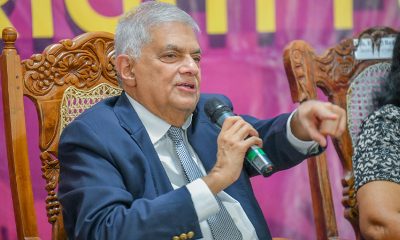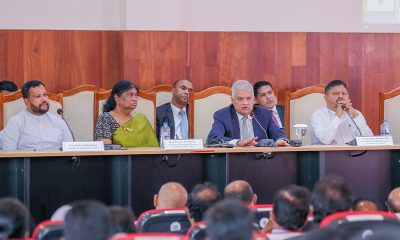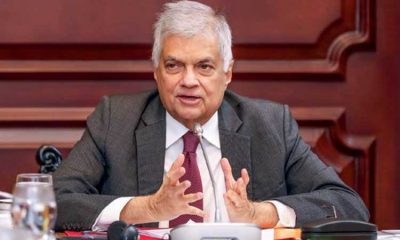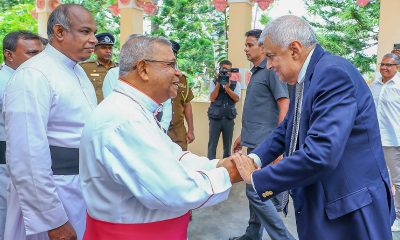Business
Sri Lanka debt relief prospects will become clearer at G20 meeting in Bengaluru: President

By Sanath Nanayakkare
The prospects for lightening the debt burden of low-income countries such as Sri Lanka will become clearer at the G20 meeting to be held in Bengaluru, President Ranil Wickremesinghe said in Colombo on Tuesday.
He said so referring to the G20 Finance Ministers and Central Bank Governors meeting under the G20 Indian presidency, scheduled during 24th-25th February, 2023.
‘By the end of this week, we will get to hear the outcome of these talks. Then we will know with greater clarity as to how they intend to cooperate on debt relief for Sri Lanka, and how we should go forward,” he said.
The President made these remarks at the Tax Forum organised by Sri Lanka Institute of Marketing (SLIM) at Kingsbury Colombo.
The 1st G20 meeting under the G20 Indian presidency will see the participation of finance ministers and central bank governors of the G20 members, invitee members and heads of international organisations. In total, there will be 72 delegation attending the meeting. According to Indian media, the Indian presidency has designed the meeting agenda in a manner that can foster a meaningful exchange of ideas among ministers and governors on pragmatic and meaningful approaches to address some of the key global economic issues including the debt crisis faced by low-income countries.
Further speaking, President Wickremesinghe recalled that India has already sent a letter ‘acceptable’ to the IMF giving their financial assurances for Sri Lanka, to facilitate a trade-off on Indian debt given to Sri Lanka
“The Paris Club also has formally announced their willingness to do the same. China has also informed us that they would stand with Sri Lanka and support us to resolve our debt crisis. The Chinese approach is different from the approach of the West in this regard. Wordings used by China is different from the wordings used by creditors in the West. And rather than joining a common platform, China has said that they would separately communicate with IMF, India and other creditors to explorer ways to help Sri Lanka lighten its debt burden. We are in discussions with China in this regard and I hope there will be a favourable outcome of these talks soon, ” he said.
“I know that people are experiencing many economic hardships. No politician would like to place economic burdens on the people. But several painful decisions had to be taken to restore significant tax revenue as a ratio to GDP, If those measures had been taken earlier, those could have been taken gradually without causing much pain. Now that the crisis has escalated, resurrection measures have to be taken faster and with greater intensity. I know that I am not popular for doing this. The IMF pointed out that our tax revenue needs to be elevated to 15% plus of the GDP at least as it was in 2019. Currently this stands at 9% plus. They asked us how we expect to get assistance from the tax money of the people of other countries while giving tax relief to our people. IMF also indicated that loss-making state owned enterprises need no longer be a burden on the Treasury.”
“The IMF listed 15 benchmarks for the government to complete by 31 December 2022. We fulfilled 14 of them in a timely manner but the electricity tariff hike dragged on. When it was finally cleared on February 15, we informed the IMF of fulfilling all benchmarks. IMF was amenable to giving us enough time till 2026 to optimize on these benchmarks by and by and improve our exports trade and foreign exchange liquidity to pay our way through the world on our own.””No country will bail us out of this crisis other than than the IMF. When the UNP ran the last election campaign on a platform that favoured an IMF bailout, we were sent home. And now the IMF benchmarks for Sri Lanka to fulfill and qualify for an IMF facility are much higher. We have to meet these benchmarks and as there is no other option. If there are alternative proposals to those of the government, please submit them to the IMF rather than talk to the press. So far only the Ceylon Chamber of Commerce has submitted a plan to the IMF with their proposals for recovery. I will be committed to continuing the government’s programme of rebuilding the country until a better set of proposals is submitted to IMF by a political party or any other organization. I hear that some trade unions are willing to talk to the IMF. I think that will be good if they go ahead and do so. Some political parties have said that if they are elected to office they will increase the tax threshold, but they have not announced how they will fill the resulting revenue deficit. They have also said that they would go the IMF and negotiate. If they do so, that’s good too because it will help accelerate the recovery process,” the President said.
Business
Steps leading to the achievement of SL’s national interest in IOR
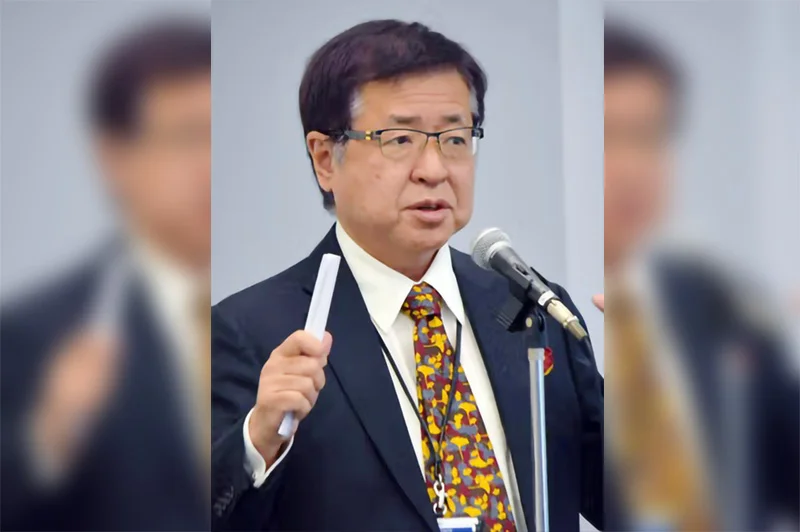
Sri Lanka needs to build awareness, effective policies and encourage regional multilateral frameworks to develop a multi-pronged approach to secure its national interest and safeguard regional stability in the Indian Ocean Region (IOR), as the region together with its seabed have become an area of strategic competition, former Assistant Chief Cabinet Secretary to former Japanese Prime Minister Shinzo Abe, Prof Nobukatsu Kanehara said.
“The Indian Ocean has been a maritime highway for millennia, with Sri Lanka being a midway point of the flow of trade, culture, technology and intellectual progress, Prof Kanehara said at the 4th Pathfinder Foundation Sri Lanka Indian Ocean Security Council Conference held recently at the Cinnamon Grand Hotel. The forum was presided over by Pathfinder Foundation Sri Lanka Chairman Ambassador (retd.) Dr. Bernard Goonetilleke.
The forum’s purpose was to obtain expert commentary regarding the need for Sri Lanka to ‘up its game’ in the IOR.
Abe said that from the 1870s onwards, the Indian Ocean had become the global communications highway, with the British Empire laying submarine cables from Aden to Mumbai, linking Europe to South Asia.
‘Since then, with the passage of time, Ceylon, and later Sri Lanka, has seen the bulk of the global digital communications umbilical laid through its maritime domain of influence, with over a dozen such cables laid over the island’s Exclusive Economic Zone (EEZ) thus far, he said.
Prof. Kanehera added: ” With the rise of Artificial Intelligence (AI) and increasing digitisation, such submarine cables have become critical strategic infrastructure for the island nation as well as the region.
‘This timely conference came as world powers rushed to secure critical minerals needed to maintain a technology edge over rivals, both militarily and economically, disrupting the longstanding rules-based order, especially at sea and in trade.
‘The lack of cognition regarding how to understand and navigate the return to a near Cold War era strategic competition in the Indian Ocean, and increasingly in the sub-surface domain and the seabed, among Sri Lanka’s policy making community, bureaucrats and public leaves the economically weakened island nation more vulnerable to geopolitical coercion, shocks and tug-o-war, which will likely increase in the coming decade.’
By Hiran H Senewiratne
Business
Automobile Association of Ceylon donates towards Disaster Relief Support Fund
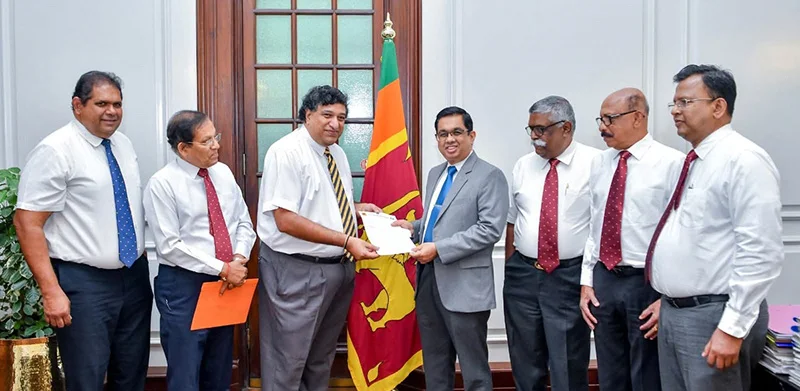
Automobile Association of Ceylon (AAC) donated Rs. 25 Million towards the Disaster Relief Support Fund to assist the Ditwah Cyclone victims.
A donation was handed over to Dr. S N Kumanayake, Secretary to the President of Democratic Socialistic Republic of Sri Lanka by Dhammika Attygalle, President – AAC at the Presidential Secretariat on the 19th February 2026 in the presence of Executive Committee members.
Dhammika Attygalle President AAC (third from Left) handing over the cheque to Dr S N Kumanayake, Secretary to the President of Democratic Socialistic Republic of Sri Lanka.
In the picture L-R Lasitha Gunaratne- EXCO Member – AAC, Devapriya Hettiarachchi – Secretary -AAC, P H Liyanage, P B Kulatunga & Indunil Udaya – Members of the EXCO – AAC
Business
‘Sri Lanka’s first AI-powered digital trainer for Banca partners’

HNB Assurance PLC recently introduced NAVI, The Digital Trainer, a new AI-powered training companion designed to support its banca staff with instant, reliable access to knowledge, whenever they need it. The solution was unveiled at Partnership Life, the company’s annual forum dedicated to celebrating the performance of its Partnership Channel.
Built to make learning simpler and more accessible, NAVI is a voice-enabled AI chatbot that helps banca staff quickly find product information, policy details, and process-related guidance by drawing from a centralized knowledge bank. Whether on the go or at the point of customer interaction, NAVI ensures that answers are never out of reach.
Sharing his thoughts, Sanesh Fernando, Chief Business Officer / GM – Partnership Channel at HNB Assurance, opined, “With NAVI, our intention is to make learning a part of everyday conversations. By combining chat and voice capabilities, we are making it easier for our officers to learn on demand and perform with greater confidence.” He further noted that it is this continuous focus on meaningful innovation that has consistently set HNB Assurance apart within the bancassurance space. “Solutions like NAVI reflect the way we think and operate as a Partnership Channel. This commitment to enabling our partners and bancassurance officers through practical, forward-thinking initiatives has been a key driver in our journey, one that has seen us being recognized as the Best Life Bancassurance Provider for five consecutive years, while also delivering strong and sustained growth year after year.”
Commenting on the launch, Suneth Jayamanne, Chief Information Officer / GM of HNB Assurance, said, “We see NAVI as a support system rather than a piece of technology. Our Bancassurance officers operate in fast-paced environments and having instant access to the right information can make all the difference. NAVI is about helping our people feel more prepared, more confident, and more connected to the knowledge they need to serve customers better.”
The launch of NAVI was marked by an engaging reveal featuring an AI-generated avatar that introduced the digital trainer and its capabilities, symbolizing a shift towards a more intuitive and people-friendly approach to learning.
As HNB Assurance continues to expand its Partnership Channel, innovations such as NAVI highlights the company’s focus on building strong, well-supported partnerships, blending technology with a deep understanding of how people learn, and work.
HNB Assurance PLC (HNBA) is one of the fastest growing Insurance Companies in Sri Lanka with a network of 79 branches. HNBA is a Life Insurance company with a rating of ‘A’ (lka) by Fitch Ratings Lanka for ‘National Insurer Financial Strength Rating’. Following the introduction of the segregation rules by the Insurance Regulator, HNB General Insurance Limited (HNBGI) was created and commenced its operations in January 2015; HNBGI continues to specialize in motor, non-motor and Takaful insurance solutions and is a fully owned subsidiary of HNB Assurance PLC. HNB General Insurance has been assigned a ‘National Insurer Financial Strength Rating’ of ‘A’ (lka) by Fitch Ratings Lanka Limited. HNBA is rated within the Top 100 brands and Top 100 companies in Sri Lanka by LMD and HNB Assurance has won international awards for Brand Excellence, Digital Marketing and HR Excellence including the Great Place To Work® Certification, and won many awards for its Annual Reports at award ceremonies organized by the Institute of Chartered Accountants of Sri Lanka.
-

 Features3 days ago
Features3 days agoWhy does the state threaten Its people with yet another anti-terror law?
-

 Features3 days ago
Features3 days agoReconciliation, Mood of the Nation and the NPP Government
-

 Features3 days ago
Features3 days agoVictor Melder turns 90: Railwayman and bibliophile extraordinary
-

 Features2 days ago
Features2 days agoLOVEABLE BUT LETHAL: When four-legged stars remind us of a silent killer
-

 Features3 days ago
Features3 days agoVictor, the Friend of the Foreign Press
-

 Latest News4 days ago
Latest News4 days agoNew Zealand meet familiar opponents Pakistan at spin-friendly Premadasa
-

 Latest News4 days ago
Latest News4 days agoTariffs ruling is major blow to Trump’s second-term agenda
-

 Latest News4 days ago
Latest News4 days agoECB push back at Pakistan ‘shadow-ban’ reports ahead of Hundred auction


